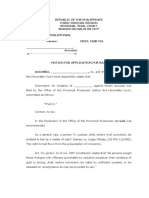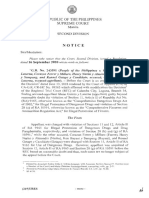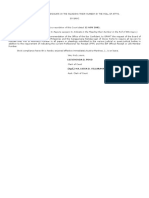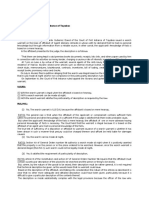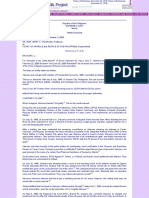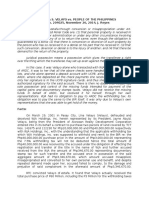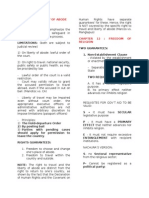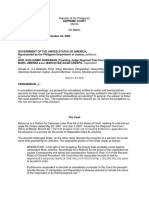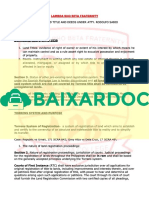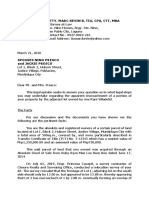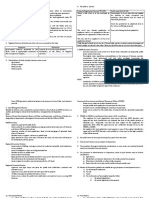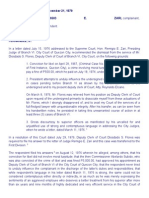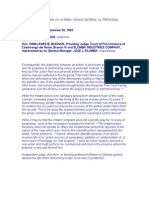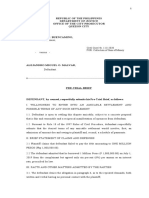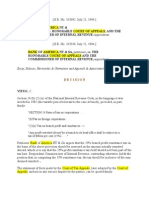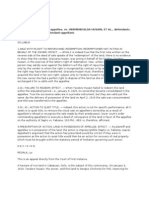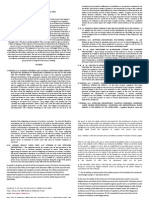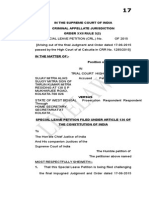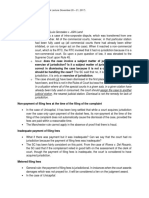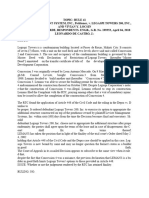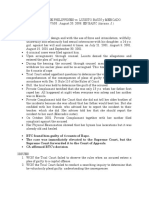PARTICULARITY OF DESCRIPTIONBache vs. RuizFacts:
After an instruction from the Comm. Of Internal revenue,revenue Examiner, Rodolfo de Leon and his witness Arturo Logronioapplied for a search warrant against the petitioners, Bache and Co(Phil) for violation of Section 46 (a) and pertinent provisions of theNIR Code, particularly 53, 72,73, 208 and 209.By means of a note, the respondent judge ordered theDeputy Clerk of the Court todepose the witnesses. After an oath,the respondent judge, Vivencio Ruiz signed the application anddirected to the peace officers for the serving of the warrant.The officers confiscated6 boxes of documents byvirtue of the warrant. The petitioners, in return filed a motion to dissolve theSearch warrant before the CFI Rizal, but was later denied.Hence this petition of certiorari, prohibition andmandamus praying for the quashal of the search warrant issued bythe Respondent Judge.
Issue:
What requisites of a valid search warrant is wanting in thecase at bar?
Held:
The case of
Bache and Co. (Phil.), Inc. v. Ruiz
, 37 SCRA 823, 835(1971), pointed out that one of the tests to determine theparticularity in the descriptionof objects to be seized under a searchwarrant is when the things described are limited to those which beardirect relation to the offense for which the warrant is being issued. Acareful examination of the Search Warrants shows that they wereworded in such a manner that the enumerated items to be seizedcould bear a direct relation to the offense of violation of Section 1and 3 of Presidential Decree No. 1866, as amended, penalizing illegalpossession of firearms, ammunitions and explosives. What thewarrants authorized was the seizure of articles proscribed by thatdecree, and no otherConstitutional provision provides 1) that a search warrantcan only be issued upon probable cause 2) single warrant for a singleoffense 3) particular description of the objects to be seized and 4)the RRC provides that a judge should personally examine thecomplainant or witnesses that he may produce under oath to proveexistence of a probable cause. The deposition should be in writingand should be attached to the record and any affidavits presented tohimIn the case at bar there is no personal examination doneby the respondent judge to the witnesses. While it may be true thatdeposition is in printed from, subscribed and sworn, the respondentdid not even asked the witnesses and the complainant any questionto prove existence of a probable cause.Second, the statutory provision of a single warrant forsingle offense rule is also violated. The single search warrant wasissued for 4 distinct offenses. a) 46 (a)failure to file income taxreturns, b) b3 (Withholding income tax at source) c) 209 (failure to
make a return of receipts, sales or business gross value outputand d)208unlawful pursuit of business.Lastly, the search warrant doesnot indicated a particularor specific description to the object to be seized. A violation in theobjective to eliminate general search warrant.*** a search warrant may be said to particularly describe the thingsto be seized when the description therein is as specific as thecircumstances will ordinarily allow or when the descriptionexpresses a conclusion of fact, not of law, by which the warrantofficer may be guided in making the search & seizure..
People vs TeeFacts:
Tee is a Chinese national in his forties, a businessman, and aresident of Baguio City. A raid conducted by operatives of theNational Bureau of Investigation (NBI) and Philippine National PoliceNarcotics Command (PNP NARCOM) at premises allegedly leased byappellant and at his residence yielded huge quantities of marijuana.On July 20, 1998, appellant moved to quash the search warrant onthe ground that it was too general and that the NBI had notcomplied with the requirements for the issuance of a valid searchwarrant.In an information dated July 24, 1998, City Prosecutor of Baguio City
charged Modesto Tee, alias “Estoy Tee,” with illegal
possession of marijuana, willfully, unlawfully, feloniously and knowingly have in hispossession the Ninety-two (92) bricks of dried flowering topsseparately contained in four (4) boxes One hundred fifty-eight (158)bricks, twenty-one (21) blocks, and twenty-three (23) bags of driedflowering tops separately contained in thirteen (13) sacks, with atotal weight of 336.93 kilograms. Six hundred two (602) bricks of dried flowering tops separately contained in twenty-six (boxes) anda yellow sack, weighing 591.81 kilograms and all having a grand totalweight of 928.74 kilograms, a prohibited drug, without the authorityof law to possess, in violation of the above-cited provision of law.
the prosecution moved to “amend” the foregoing charge sheet“considering t
hat subject marijuana were seized in two (2) differentplaces. As a result, the information was split into two separateinformation.Prosecution witness Danilo Abratique, a Baguio-based taxidriver, and the appellant Modesto Tee are well acquainted with
each other, since Abratique’s wife is the sister of Tee’s sister
Sometime in late June 1998, appellant asked Abratique to findhim a place for the storage of smuggled cigarettes.
Abratiquebrought appellant to his friend, Albert Ballesteros, who had a housefor rent in Bakakeng, Baguio City. After negotiating the terms andconditions, Ballesteros agreed to rent out his place to appellant.
Appellant then brought several boxes of purported “blue seal”
cigarettes to the leased premises.




Shortly thereafter, however, Ballesteros learned that the
boxes stored in his place were not “blue seal” cigarettes but
marijuana. Fearful of being involved, Ballesteros informed Abratique.Both later prevailed upon appellant to remove them from thepremises.
Appellant then hired Abratique’s taxi and transported theboxes of cannabis from the Ballesteros place to appellant’s
residence at Km. 6, Dontogan, Green Valley, Sto. Tomas, Baguio City.appellant hired Abratique to drive him to La Trinidad, Benguet onthe pretext of buying and transporting strawberries. Upon reachingLa Trinidad, however, appellant directed Abratique to proceed toSablan, Benguet, where appellant proceeded to load several sacks of
marijuana in Abratique’s taxi.
He then asked Abratique to find him aplace where he could store the contraband.
Abratique brought appellant to his grandmother’s house at No.
27 Dr. Cariño St., QM Subdivision, Baguio City, which was being
managed by Abratique’s aunt, Nazarea Abreau. Naz
area agreed torent a room to appellant. Abratique and appellant unloaded andstored there the sacks of marijuana brought fromSablan.
Abratique was aware that they were transportingmarijuana as some of the articles in the sacks became exposed inthe process of loading.On the morning of July 1, 1998, alerted by information thatappellant would retrieve the sacks of prohibited drugs that day,Edwin Fianza and other NBI operatives conducted a stake out at No.27, Dr. Cariño St. While the NBI agents were conducting theirsurveillance, they noticed that several PNP NARCOM personnel werealso watching the place.
The NBI then learned that the PNPNARCOM had received a tip from one of their informers regardingthe presence of a huge amount of drugs in that place. The NBI andPNP NARCOM agreed to have a joint operation.As the day wore on and appellant did not show up, the NBIagents became apprehensive that the whole operation could be jeopardized. They sought the permission of Nazarea Abreau to enterthe room rented by appellant. She acceded and allowed them entry.The NBI team then searched the rented premises and found four (4)boxes and thirteen (13) sacks of marijuana, totaling 336.93kilograms.
Later that evening, NBI Special Agent Darwin Lising, withAbratique as his witness, applied for a search warrant from RTCJudge Antonio Reyes at his residence. Thereafter, the judge issued a
warrant directing the NBI to search appellant’s residence.
The NBI operatives, with some PNP NARCOM personnel in tow,
proceeded to appellant’s residence where they served the warrant
upon appellant himself .
The search was witnessed by appellant,members of his family, barangay officials, and members of themedia.The law enforcers found 26 boxes and a sack of driedmarijuana
in the water tank, garage, and storeroom of appellant’s
residence.
Appellant was arrested for illegal possession of marijuana.The seized items were then submitted to the NBI laboratoryfor testing. NBI Forensic Chemist Maria Carina Madrigal conductedthe tests and showed these to be marijuana.In his defense, appellant contended that the physical evidenceof the prosecution was illegally obtained, being the products of anunlawful search, hence inadmissible. Appellant insisted that thesearch warrant was too general and the process by which saidwarrant was acquired did not satisfy the constitutional requirements
for the issuance of a valid search warrant. Moreover, Abratique’s
testimony, which was heavily relied upon by the judge who issuedthe warrant, was hearsay.the trial court agreed with appellant that the taking of the336.93 kilograms of marijuana was the result of an illegal search andhence, inadmissible in evidence against appellant. Appellant wasaccordingly acquitted of the charge. However, the trial court found
that the prosecution’s evidence was more than ample to proveappellant’s guilt in Criminal Case No. 15800
-R and as earlier stated,duly convicted him of illegal possession of marijuana and sentencedhim to death.Appellant initially contends that the warrant, which directed
the peace officers to search for and seize “an undetermined amountof marijuana,” was too general and hence, void for vagueness. He
insists that Abratique could already estimate the amount of
marijuana supposed to be found at appellant’s residence since
Abratique helped to transport the same.For the appellee, the Office of the Solicitor General (OSG)counters that a search warrant is issued if a judge finds probablecause that the place to be searched contains prohibited drugs, andnot that he believes the place contains a specific amount of it. TheOSG points out that, as the trial court observed, it is impossiblebeforehand to determine the exact amount of prohibited drugs thata person has on himself.
Appellant avers that the phrase “an undetermined amount of marijuana” as used in the search warrant fails to satisfy the
requirement of Article III, Section2
things to be seized must be particularly described. Appellant’s
contention, in our view, has no leg to stand on.
Issue:
WON, the search warrant is valid despite the lack of particularity of the description?
Held:
The contitutional requirement of particularity of description of search warrant is primarily meant to be enable the law enforcersserving the warrant to:(1) readily identify the properties to be seized and thusprevent them from seizing the wrong items; and(2) leave said peace officers with no discretion regardingthe articles to be seized and thus prevent unreasonablesearches and seizures.The search warrant in the present case, given its nearly similar
wording, “undetermined amount of marijuana or Indian hemp,” inour view, has satisfied the Constitution’s requirements on
particularity of description. The description therein is: (1) as specificas the circumstances will ordinarily allow; (2) expresses a conclusionof fact
–
not of law
–
by which the peace officers may be guided inmaking the search and seizure; and (3) limits the things to be seizedto those which bear direct relation to the offense for which thewarrant is being issued.
PEOPLE v VELOSOFacts:-
In May, 1923, the building located at No. 124 Calle Arzobispo, Cityof Manila, was used by an organization known as the ParliamentaryClub. Jose Ma. Veloso was at that time a member of the House of Representative of the Philippine Legislature. He was also themanager of the club.-The police of Manila had reliable information that the so-calledParliamentary Club was nothing more than a gambling house.Indeed, on May 19, 1923, J. F. Townsend, the chief of the gamblingsquad, had been to the club and verified this fact. As a result, onMay 25, 1923, Detective Andres Geronimo of the secret service of the City of Manila, applied for, and obtained a search warrant fromJudge Garduño of the municipal court. Thus provided, the policeattempted to raid the Parliamentary Club a little after three in theafternoon of the date above- mentioned. They found the doors tothe premises closed and barred. Accordingly, one band of policeincluding policeman Rosacker, ascended a telephone pole, so as toenter a window of the house. Other policemen, headed byTownsend, broke in the outer door.-Once inside the Parliamentary Club, nearly fifty persons wereapprehended by the police. One of them was the defendant Veloso.Veloso asked Townsend what he wanted, and the latter showed himthe search warrant. Veloso read it and told Townsend that he wasRepresentative Veloso and not John Doe, and that the police had noright to search the house. Townsend answered that Veloso wasconsidered as John Doe. As Veloso's pocket was bulging, as if itcontained gambling utensils, Townsend required Veloso to show himthe evidence of the game. About five minutes was consumed inconversation between the policemen and the accused thepolicemen insisting on searching Veloso, and Veloso insisting in hisrefusal to submit to the search.-At last the patience of the officers was exhausted. So policemanRosacker took hold of Veloso only to meet with his resistance.Veloso bit Rosacker in the right forearm, and gave him a blow inanother part of the body, which injured the policeman quiteseverely. Through the combined efforts of Townsend and Rosacker,Veloso was finally laid down on the floor, and long sheets of paper,of reglas de monte, cards, cardboards, and chipswere taken fromhis pockets.-All of the persons arrested were searched and then conducted tothe patrol wagons. Veloso again refused to obey and shoutedoffensive epithets against the police department. It was necessaryfor the policemen to conduct him downstairs. At the door, Velosoresisted so tenaciously that three policemen were needed to placehim in the patrol wagon.
Issue:
WON the search warrant and the arrest of Veloso was valid.
Ruling:
Yes.
RD:
It is provided, among other things, in the Philippine Code on Criminal
Procedure that “
a search warrant shall not issue except for probablecause and upon application supported by oath particularlydescribing the place to be searched and the person of thing to be
seized.”
The name and description of the accused should be inserted in thebody of the warrant and where the name is unknown there must besuch a description of the person accused as will enable the officer toidentify him when found.A warrant for the apprehension of a person whose true name isunknown, by the name of "John Doe" or "Richard Roe," "whoseother or true name in unknown," is void, without other and furtherdescriptions of the person to be apprehended, and such warrant willnot justify the officer in acting under it. Such a warrant must, inaddition, contain the best description personae possible to beobtained of the person or persons to be apprehended, and thisdescription must be sufficient to indicate clearly the proper personor persons upon whom the warrant is to be served; and should statehis personal appearance and peculiarities, give his occupation andplace of residence, and any other circumstances by means of whichhe can be identified.In the first place, the affidavit for the search warrant and the searchwarrant itself described the building to be searched as "the buildingNo. 124 Calle Arzobispo, City of Manila, Philippine Islands." This,without doubt, was asufficient designation of the premises to besearched.As the search warrant stated that John Doe had gambling apparatusin his possession in the building occupied by him at No. 124 CalleArzobispo, City of Manila, and as this John Doe was Jose Ma. Veloso,the manager of the club, the police could identify John Doe as JoseMa. Veloso without difficulty.
PANGANDAMAN v CASARFACTS
- On July 27, 1985, a shooting incident occurred in Pantao, Masiu,Lanao del Sur, which left at least five persons dead and two otherswounded. What in fact transpired is still unclear. According to oneversion, armed men had attacked a residence in Pantao, Masiu, withboth attackers and defenders suffering casualties. Another versionhas it that a group that was on its way to another place, Lalabuan,also in Masiu, had been ambushed.- The next day, a lawyer (Atty. Batuampar) of one of the widows fileda letter-
complaint with the fiscal, asking for a “
full blast preliminaryinvest
igation”
. The letter adverted to the possibility of innocentpersons being implicated by the parties involved on both sides noneof whom was, however, identified and promised that supportingaffidavits would shortly be filed. Immediately the Provincial Fiscaladdressed a "1st indorsement" to the respondent Judge,transmitting Atty. Batuampar's letter and requesting that "all casesthat may be filed relative .. (to the incident) that happened in theafternoon of July 27, 1985," be forwarded to his office, which "hasfirst taken cognizance of said cases.- On August 10, 1985, a criminal complaint for multiple murder wasfiled. On the same day, respondent Judge examined personally the 3witnesses. Thereafter, the Judge approved the complaint and issueda warrant of arrest against the 14 petitioners (who were named bythe witnesses) and 50 "John Does.- On Aug 14, 1985, an ex-parte motion was filed by Atty. Batuamparseeking recall of the warrant of arrest and subsequent holding of a"thorough investigation" on the ground that the Judge's initialinvestigation had been "hasty and manifestly haphazard" with "nosearching questions" having been propounded. The respondentJudge denied the motion for "lack of basis;" hence the presentpetition.
ISSUE
WON,
the Search Warrants are in the Nature of General Warrants?
HELD
YES
- The argument, therefore, must be rejected that the respondentJudge acted with grave abuse of discretion in issuing the warrant of arrest against petitioners without first completing the preliminaryinvestigation in accordance with the prescribed procedure. The ruleis and has always been that such issuance need only await a findingof probable cause, not the completion of the entire procedure of preliminary investigation.- Also without appreciable merit is petitioners' other argument thatthere was scarcely time to determine probable cause against sixty-four persons (the fourteen petitioners and fifty "Does") within amatter of hours on a Saturday when municipal trial courts are openonly from 8:00 a.m. to 1:00 p.m. Nothing in the record before thisCourt belies or discredits those affirmations which have, besides, thebenefit of the legal presumption that official duty has been regularlyperformed.- Insofar, however, as said warrant is issued against fifty (50) "JohnDoes" not one of whom the witnesses to the complaint could orwould Identify, it is of the nature of a general warrant, one of a classof writs long proscribed as unconstitutional and once anathematizedas "totally subversive of the liberty of the subject." Clearly violativeof the constitutional injunction that warrants of arrest shouldparticularly describe the person or persons to be seized, the warrantmust, as regards its unidentified subjects, be voided.
Dispositive
Warrants against petitioners upheld; warrants againstJohn Does denied.
MICROSOFT CORPORATION and LOTUS DEVELOPMENTCORPORATION,
petitioners,vs.
MAXICORP, INC.,Facts:
On 25 July 1996, National Bureau of Investigation ("NBI") AgentDominador Samiano, Jr. ("NBI Agent Samiano") filed severalapplications for search warrants in the RTC against Maxicorp foralleged violation of Section 29 of PD 49 and Article 189 of the RPC.After conducting a preliminary examination of the applicant and hiswitnesses, Judge William M. Bayhon issued Search Warrants againstMaxicorp.Armed with the search warrants, NBI agents conducted on 25 July
1996 a search of Maxicorp’s premises and seized property fitting the
description stated in the search warrants.On 2 September 1996, Maxicorp filed a motion to quash the searchwarrants alleging that there was no probable cause for theirissuance and that the warrants are in the form of "general
warrants." The RTC denied Maxicorp’s motion on 22 January 1997.The RTC also denied Maxicorp’s motion for recons
ideration.The RTC found probable cause to issue the search warrants afterexamining NBI Agent Samiano, John Benedict Sacriz ("Sacriz"), andcomputer technician Felixberto Pante ("Pante"). The three testifiedon what they discovered during their respective visits to Maxicorp.NBI Agent Samiano also presented certifications from petitionersthat they have not authorized Maxicorp to perform the witnessed
activities using petitioners’ products.
On 24 July 1997, Maxicorp filed a petition for certiorari with the
Court of Appeals seeking to set aside the RTC’s order. On 23December 1998, the Court of Appeals reversed the RTC’s orderdenying Maxicorp’s motion to quash the search warrants.
Petitioners moved for reconsideration. The Court of Appeals deniedpetitioner
s’ motion on 29 November 1999.





